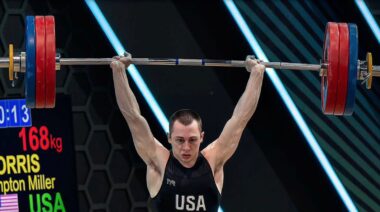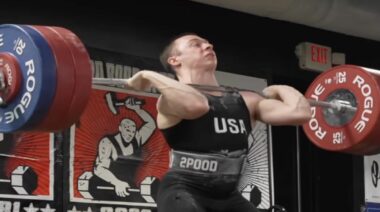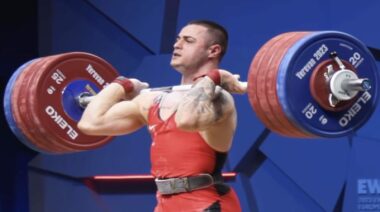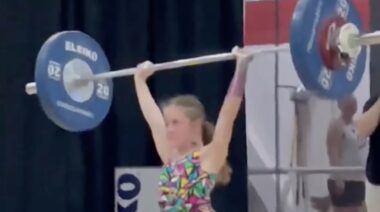Before I ever entered a weightlifting competition, I had a rather naïve view of the whole process. Most newcomers do. I figured that all you had to do was train, enter a meet, and lift the most that you could. How wrong I was. There was a lot more to it than I had ever imagined, and the longer I’ve been involved with the sport, the more that I find there is to master.
Master the art of optimal mental performance and reach success. [Photo credit: Michael Jones/CC BY 2.0]
The Art of Competition Performance
The art of performing is composed of a collection of skills. They cannot be mastered quickly nor easily by the neophyte. They can only be learned by going through the process of performance. The skills required to perform in weightlifting competition are very similar to the mental aspects of performance in many sports or performing arts. Thus, those with a performance background can transfer those skills easily to weightlifting.
The ideal model for learning performance takes place in sports that are less physically demanding than weightlifting. In a typical basketball program, there might be a pre-season in which a team can compete in several games, followed by a regular season with two games per week. Over the course of a season that includes playoffs, a player might have 20 or more game-type situations. This represents a considerable number of opportunities to learn and practice performance skills.
Because of the tremendous physical and mental efforts required in weightlifting competition, it is not possible for most neophytes to gain sufficient competitive experience by simply entering competitions. A new lifter might need a macrocycle of eight weeks before lifting in a “meaningful” competition, meaning one for which their programming has been specifically designed. This would limit the athlete to no more than six competitions per year. Such a competition schedule is neither numerous nor frequent enough to perfect the psychological components of competing.
The most reasonable alternative is for the athlete to mentally rehearse the competitive experience. This process of autogenesis has long been a practice of athletes attempting to achieve the optimal psychological state for competition and performance.
The Relaxed State
This mental rehearsal takes place most effectively when you are in the relaxed state. In this state you are not aware of any input from your body and your mind is free to create its own illusions. To achieve this state, you must select a time when you are not drowsy or sleepy. You need to be in subdued lighting and at a comfortable temperature. You should have a firm, but comfortable platform (mattress, etc.) upon which to recline. The room should be quiet.
When you are ready to begin, lie face-up on the bed and begin the process of achieving the relaxed state:
Fractional Relaxation
This will take some practice, but can be mastered by most. Lie quietly without movement. The initial concentration should be on relaxing the feet, imagining them turning to liquid until there is very little sensory input from them. When this state of relaxation is achieved and there is virtually no feeling in the feet, the attention can then move up to the lower legs. Again, the attempt is to relax the muscles to the point where the you are no longer aware of their presence and can receive no sensory input. The next area is the thighs, where once again you focus on turning your muscles into liquid until they relax and can provide you with no further sensory input.
Continue this process throughout the body until you are only aware of your heartbeat. You should feel as though you are nothing more than a brain lying on a pillow.
You may not reach this state the first few times, but eventually you should be able to reach this relaxed state. At this point you are ready to run the video in your head where you are the competitor; the most successful competitor.
Play the Movie
Once you’ve reached this point, you can begin to visualize yourself approaching the platform. You see and hear only those things that are relevant to the performance. You can hear your coach’s voice. You can see your path leading to the competition platform. You feel yourself chalking your hands and then stepping on the platform.
You can feel yourself testing the spin of the competition bar and then taking your grip. As you begin to pull the bar off the platform you should feel the contractions of the appropriate muscles, and the relaxation of their antagonists. You can feel yourself standing with the bar after the successful lift and then receiving the down signal.
Repeat this procedure for all six lifts. With each one, the feelings become more and more real. By the conclusion of the six lifts you feel as though you’ve actually performed in a competition.
Rehearse Often
Practicing this frequently, say once a day, should provide you with increased confidence as you approach competition. By the time you get to the meet, you should feel as though you’ve done this many times over and there should be few, if any, surprises.
Become a Master
Although most of the material available about competition preparation is concerned with the physical aspects, great results cannot be obtained without sufficient psychological preparation. The best lifters have mastered the psychological aspects of competitive performance and have spent considerable time doing so. If you are to fulfill your potential, you must spend some time on developing the psychological skills that will enable you to make the most of your physical preparation.
Sharpen your mental toolchest:
Make the Switch to Better Habits and Mindset






